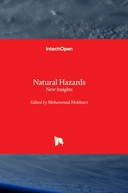Explore

In a world shaped by the forces of nature, humankind has always sought to understand and mitigate the impacts of natural hazards. Natural Hazards - New Insights delves into the intricate realm of floods, earthquakes, tsunamis, meteoritical hazards, mining-related disasters, and other major catastrophes that afflict our planet. This book takes readers on a journey to gain a deeper understanding of these phenomena, unearthing fresh insights into their causes, impacts, and strategies to mitigate their effects. Organized into six comprehensive sections, this book begins with a global perspective on natural hazards, laying the foundation for understanding the diverse range of challenges they pose. It then explores seismic hazards, analyzing earthquake patterns, urban damage assessment, fault reactivation, and more. Shifting the focus to flooding as a natural hazard, the book examines hydrological extremes, flood mapping, and risk reduction strategies. It further explores climatological hazards, including the intricate relationship between climate change and natural disasters, remote sensing technologies, and the impacts of climate change on agriculture. Landslides are also scrutinized as significant natural hazards, with chapters on polarization analysis, landslide assessment, hazard zonation, and the impact of underground coal mining methods on slope stability. Lastly, the book addresses the social challenges that arise when disasters strike, examining psychological reactions, spontaneous volunteers, urban planning responses, and social vulnerability to earthquake hazards. Through peer-reviewed chapters, this book offers valuable insights and expertise from renowned authors in the field. Their contributions have shaped this comprehensive exploration, which aims to navigate the challenges, minimize risks, and build a safer and more sustainable environment for future generations.
This book is included in DOAB.
Why read this book? Have your say.
You must be logged in to comment.
